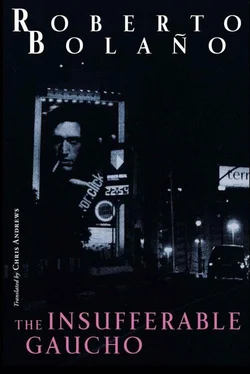Then the train began to advance across the pampas, and the lawyer leaned his head against the cold glass of the window and fell asleep.
When he woke, the carriage was half empty and there was a man who looked part Indian sitting beside him, reading a Batman comic. Where are we? asked Pereda. In Coronel Gutiérrez, said the man. Ah, that’s all right, thought the lawyer, I’m going to Capitán Jourdan. Then he got up, stretched his legs, and sat down again. Out on the dry plain he saw a rabbit that seemed to be racing the train. There were five other rabbits running behind it. The first rabbit, running just outside the window, had wide-open eyes, as if the race against the train required a superhuman effort (super-leporine, actually, thought the lawyer). The rabbits in pursuit, on the other hand, seemed to be running in tandem, like cyclists in the Tour de France. With a couple of big leaps, the rabbit bringing up the rear relieved the front-runner, who dropped back to last position, while the third rabbit moved up to second place, and the fourth moved up to third; and all the while the group was closing in on the solitary rabbit running beside the lawyer’s window. Rabbits, he thought, how wonderful! On the plains there was nothing else to be seen: a vast, boundless expanse of scanty grass under massive, low clouds, and no indication that a town might be near. Are you going to Capitán Jourdan? Pereda asked the Batman reader, who seemed to be examining every panel with extreme care, scrutinizing every detail, as if he were visiting a portable museum. No, he replied, I’m getting off at El Apeadero. Pereda tried to remember a station of that name but couldn’t. And what’s that, a station or a factory? The guy with the Indian look stared back at him fixedly: A station, he replied. He seems annoyed, thought Pereda. It wasn’t the sort of question he would normally have asked, given his habitual discretion. The pampas had made him inquire in that frank, manly, and down-to-earth way, he thought.
When he rested his forehead against the window again, he saw that the rabbits in pursuit had caught up with the lone racing rabbit, and were attacking it ferociously, tearing at its body with their claws and teeth, those long rodents’ teeth, thought Pereda with a horrified frisson. He looked back and saw a bundle of tawny fur thrashing about beside the rails.
The only passengers who got off at the station in Capitán Jourdan were Pereda and a woman with two children. The platform was half wood, half cement, and in spite of his best efforts Pereda couldn’t find a railway employee anywhere. The woman and the children set off walking on a cart track, and although they were clearly moving away and their figures were visibly shrinking, it took more than three quarters of an hour, according to the lawyer’s reckoning, for them to disappear over the horizon. Is the earth round? Pereda wondered. Of course it is, he told himself, as he settled down for a lengthy wait on an old wooden bench against the wall of the station offices. Inevitably, he remembered Borges’s story “The South,” and when he thought of the store mentioned in the final paragraphs, tears brimmed in his eyes. Then he remembered the plot of Bebe’s last novel, and imagined his son writing on a computer, in an austere office at a Midwestern university. When Bebe comes back and finds out I’ve gone to the ranch. ., he thought in enthusiastic anticipation. The glare and the warm breeze blowing off the plain made him drowsy; he fell asleep. A hand shook him awake. A man as old as he was, wearing a worn-out railway uniform, asked him what he was doing there. Pereda said he was the owner of the Alamo Negro ranch. The man stood there looking at him for a while, then said: The judge. That’s right, replied Pereda, there was a time when I was a judge. Don’t you remember me, Mister Judge? Pereda scrutinized the man: he needed a new uniform and a haircut, urgently. Pereda shook his head. I’m Severo Infante, said the man. We used to play together when we were kids. But, che , that’s ages ago — how could I remember, Pereda retorted, and the sound of his voice, not to mention the words he had used, sounded odd, as if the air of Capitán Jourdan had invigorated his vocal chords or his throat.
Of course, you’re right, Mister Judge, said Severo Infante, but I feel like celebrating anyway. Bouncing like a kangaroo, the station employee disappeared into the ticket office, then came out with a bottle and a glass. Your health, he said, handing Pereda the glass, which he half filled with a clear liquid that seemed to be pure alcohol. Pereda took a sip — it tasted of scorched earth and stones — and left the glass on the bench. He said he had given up drinking. Then he got up and asked the way to his ranch. They went out the back door. Capitán Jourdan is over there, said Severo, just beyond the dry pond. Alamo Negro is the other way, a bit further, but you can’t get lost in the daylight. You look after yourself, said Pereda, and set off in the direction of his ranch.
The main house was almost in ruins. That night it was cold, and Pereda tried to gather some sticks and light a campfire, but he couldn’t find anything to burn, and in the end he wrapped himself up in his overcoat, rested his head on his suitcase, and told himself, as he fell asleep, that tomorrow would be another day. He woke with the first light of dawn. There was still water in the well, although the bucket had disappeared and the rope was rotten. I need to buy a rope and a bucket, he thought. For breakfast he ate what was left of a packet of peanuts he had bought on the train. He inspected the multitudinous low-ceilinged rooms of the ranch house. Then he set off for Capitán Jourdan, and was surprised to see rabbits but no cattle on the way. He observed them uneasily. Occasionally they would hop toward him, but he only had to wave his arms to make them disappear. Although he had never been particularly keen on guns, he would have been glad of one then. Apart from that, the walk was pleasant: the air was fresh, the sky was clear; it was neither hot nor cold. From time to time he spotted a tree all alone out on the plain, and the vision struck him as poetic, as if the tree and the austere scenery of the deserted countryside had been arranged just for him, and had been awaiting his arrival with an imperturbable patience.
None of the roads in Capitán Jourdan were paved and the housefronts were thickly coated with dust. As he entered the town, he saw a man asleep beside some flowerpots containing plastic flowers. My god, it’s so shabby! he thought. The main square was broad, and the town hall, built of brick, gave the collection of squat, derelict buildings a vague air of civilization. He asked a gardener who was sitting in the square smoking a cigarette where he could find a hardware store. The gardener looked at him curiously, then accompanied him to the door of the only hardware store in town. The owner, an Indian, sold him all the rope he had in stock: forty yards of braided hemp, which Pereda examined at length, as if looking for loose threads. Put it on my account, he said when he had decided what to buy. The Indian looked at him nonplussed. Whose account? he asked. Manuel Pereda’s, said Pereda, as he piled up his new possessions in a corner of the store. Then he asked the Indian where he could buy a horse. There are no horses left here, he said, only rabbits. Pereda thought it was a joke and responded with a quick, dry laugh. The gardener, who was looking in from the threshold, said there might be a strawberry roan to be had at Don Dulce’s ranch. Pereda asked him how he could get there, and the gardener walked a couple of blocks with him, to a vacant lot full of rubble. Beyond lay open country.
The ranch was called Mi Paraíso and it didn’t seem to be as run down as Alamo Negro. A few chickens were pecking around in the yard. The door to the shed had been pulled off its hinges and someone had propped it against a wall nearby. Some Indian-looking kids were playing with bolas. A woman came out of the main house and said good afternoon. Pereda asked her for a glass of water. Between mouthfuls he asked if there was a horse for sale. You’ll have to wait for the boss, said the woman, and went back into the house. Pereda sat down beside the well and kept himself busy brushing away the flies that were buzzing around everywhere, as if the yard were used for pickling meat, thought Pereda, although the only pickles he knew were the ones he used to buy many years ago at a store that imported them directly from England. After an hour, he heard the sound of a jeep and stood up.
Читать дальше












